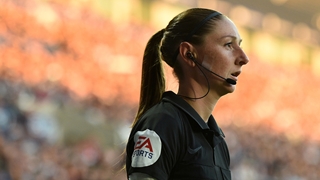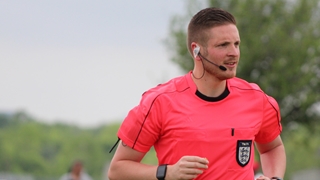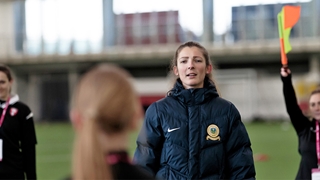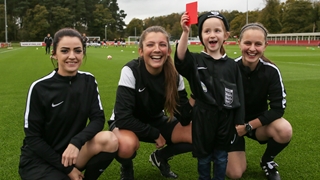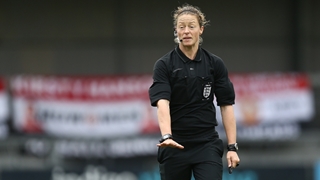
Kirsty Dowle has loved football her whole life but never even considered becoming a referee until after she had written her dissertation on them.
That was six years ago, now the 28-year-old is FIFA Women’s Referee and Level 3 in the Men’s game, regularly taking charge of top-flight women's football in the Barclays FA WSL.
But what has happened in between now and then? We put some questions to the official...
How did you first get into refereeing?
I’ve played football since I was about six years old so it's always been a part of my life – I love it.
For some reason, while I was writing my sports science dissertation at the University of Portsmouth, I decided that I would choose refereeing to focus on.
I interviewed lots of very interesting referees and a few of them suggested to me that I give it a go – and then I thought to myself that I might be able to make it further than as a player.
What happened in the last game you refereed?
Barclays FA Women's Super League: Brighton 0-4 Arsenal – 12 January 2020
Arsenal dominated the game and scored within three minutes, which really set the tone and from then on it was about keeping the ball and game management for them.
For Brighton, it was more that they needed to stop conceding but obviously take their chances when they came – but they weren’t able to do that.
From my perspective, I had to keep on top of the little fouls that were going on but more just to keep switched on and alert because it's very easy to slip into the tempo of the game when one team is dominating.
Then in the last minute, for Arsenal’s final goal, there was a penalty in the build up but Beth Mead was able to score and it was something I still needed to register and have my whistle ready to blow for.
Beth Mead capitalises on Megan Walsh's error to put @ArsenalWFC four up against Brighton.
— Match of the Day (@BBCMOTD) January 12, 2020
Live on BBC Red Button and online: https://t.co/sROiUHif9M #bbcfootball pic.twitter.com/MzEaozfEz1
Where did you take your first course and then where did you officiate your first game?
I enrolled at Ramsgate and my first game will have been reffing for the Sandwich U10s.
A colleague of mine brought me a spare kit to use and I remember putting it on and it was so big it felt like I was wearing a nightie.
The main thing I remember from the game was that I allowed one team to make a sub while the goalkeeper held the ball for more than six seconds and I just allowed them to play on.
Nobody said anything, nothing came of it either but I knew I had made a massive mistake – I just thought to myself: ‘I will never let that happen again'.
Is there one moment from your early experiences of officiating that has stayed with you ever since?
It was still early in my career because I was officiating youth football still, but it was an U16s match and I remember the conditions were awful but both teams agreed to play.
The game was rubbish but all I can remember from it is both of the managers just shouting at me relentlessly.
It’s hard to put into words how that makes you feel but my parents were there watching, they told me that I had done a good job but because of the way I was shouted at, I had such a low opinion of myself.
You know it isn’t personal, because they’ve said it during the game and it isn’t like you’ve been offended in the street, but you have to put things into perspective and know what you’re letting yourself in for – not that that makes it right.
What are the main benefits or enjoyments that you take from officiating?
Off the pitch I work on the railways and I actually encounter a lot of conflict and confrontation doing that.
I think refereeing has definitely helped me with the way I talk to people and has given me the confidence to tell people straight if I need to.
Of course, other people you need to speak to differently because everybody reacts differently and it's helped with the way that I'm able to pitch myself in certain situations.
Do you have specific ambitions to reach a certain level in the game?
This is my first year as a FIFA referee so I think I'll have a lot to learn over the next few years. Hopefully I can start to climb that ladder and see where it takes me.
What would be your advice to anyone who is thinking of starting out?
You need to be completely open to learning and be a ‘yes’ person who takes the opportunities that come your way because that is the only way you can develop.
Every level I get to, I start to think straight away ‘how can I get to the next one?’ So you need to be a sponge and absorb everything you can that is going on around you.
Can you tell us something we don’t know about refereeing?
I didn’t realise how much commitment it is, but that's only because of the amount I want to put into it.
It takes up a lot of my time but only because I want it to. I train six days a week to stay fit and then if I ref a game it’s the same hours as a full day’s work.
People I have spoken to think it is a matter of turning up for 90 minutes then going home but there’s a lot more that goes on behind the scenes that I don’t think people realise.
And we do care about the decisions we make and our performances – if I get something wrong I can’t sleep at night and I don’t think people are aware that we think like that.
Are you inspired by Kirsty's story? Why not make your own way in refereeing on one of our courses?
GET INTO REFEREEING


.ashx?cw=320&ch=180&resizemode=crop&jq=100&hash=AFD1E856496DF2C11E1041DB26F16D5639F21680&la=en)
